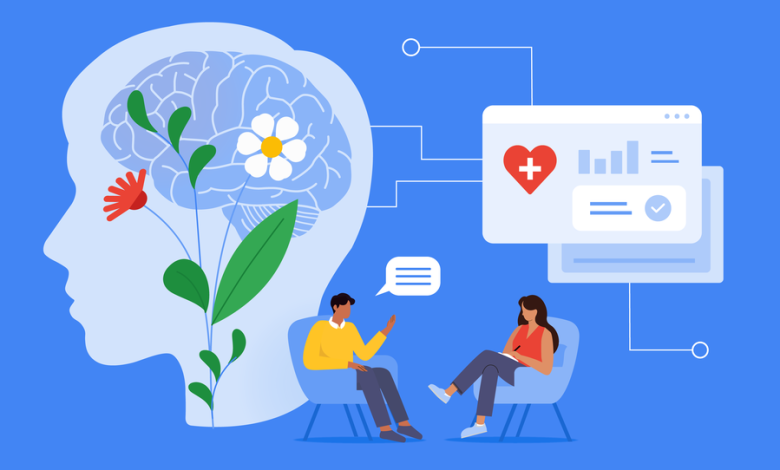
In today’s fast-paced world, managing mental health has become a daily challenge for millions. But what if the very data you produce each day, your sleep patterns, screen time, or even your heart rate, could help you understand and improve your wellbeing?
That’s where data analytics and AI therapy come together. By pairing self-tracking tools (like mood journals and wearables) with AI-powered therapy apps, we’re entering a new era of mental health support that’s personal, proactive, and surprisingly effective.
What Is Self-Tracking + AI Therapy?
At its core, self-tracking simply means paying attention to your habits and how they affect your mood. That might mean logging how you feel each morning, noting your sleep hours, or using a smartwatch to track your heart rate and daily movement.
AI therapy, on the other hand, uses artificial intelligence to deliver evidence-based mental health support. Think chatbots that walk you through CBT (Cognitive Behavioural Therapy) exercises, apps that suggest mindfulness prompts based on your stress levels, or systems that spot early warning signs of burnout.
Together, these tools form a loop:
Track → Analyse → Intervene → Learn
You record your feelings and habits, the AI analyses your patterns, delivers support in real time, and helps you reflect and improve.
Why This Combination Works
Recent studies show that when self-tracking is paired with AI therapy, the impact can be significant:
- AI therapy apps such as Woebot, Abby, and Youper have shown 20–50% reductions in symptoms of anxiety and depression after a few weeks of consistent use.
- Wearable devices can track changes in heart-rate variability (HRV), sleep, and activity, all of which strongly correlate with stress and mood changes.
- Digital phenotyping (using passive data from your phone and sensors) has shown promise in detecting early signs of distress before a person even recognises it themselves.
- Engagement rates with self-tracking and mental health apps often reach 60–80%, showing that people are not just downloading them, they’re sticking with them.
In short: combining data analytics with AI therapy turns abstract information into actionable insight that can genuinely improve your emotional well-being.
Benefits of Self-Tracking + AI Therapy
1. You See What You Couldn’t Before
It’s easy to miss the connection between your lifestyle and your mood. But data rarely lies. By analysing your habits, you might notice your anxiety spikes 25–35% more after nights with less than six hours of sleep or when you skip breakfast. Once you see the pattern, it becomes easier to make changes that matter.
2. Personalised Support, Right When You Need It
AI therapy apps can detect your emotional state and send the right prompt at the right time. For example, when your HRV drops or your tone becomes tense in messages, the AI might suggest a quick breathing exercise or grounding technique. In trials, these timely nudges led to 20–30% reductions in stress symptoms.
3. It Helps You Stay Consistent
Consistency is the hardest part of self-improvement. But digital reminders help. Studies show that people who use daily AI check-ins or CBT reminders stick to healthy routines at rates above 70%, compared to under 50% in self-help without reminders. Small, regular practice compounds into lasting change.
4. It Strengthens Human Therapy
For those already seeing a therapist, self-tracking can make sessions more productive. By sharing weekly mood reports or sleep summaries, your therapist can spend less time asking “How was your week?” and more time addressing what really matters. Clinicians say this kind of digital insight makes therapy more focused and collaborative.
5. It Can Catch Problems Early
AI can sometimes spot trouble before you do. By monitoring changes in your sleep, tone, or daily check-ins, AI tools can alert you (or even your therapist) to signs of relapse or burnout. This proactive approach allows you to get help sooner, before small problems grow into crises.
Real-Life Examples
- Mood & Sleep Combo: You log daily moods while your smartwatch tracks sleep. After a week, the AI notices a pattern: poor sleep = lower mood. It suggests a bedtime routine and sleep hygiene tips. Within two weeks, your average mood score rises.
- Workplace Stress Tracking: An employee syncs their work calendar with a stress-tracking app. When back-to-back meetings cause elevated heart rates, the AI recommends a two-minute mindfulness break. Over time, burnout risk drops.
- Therapist Collaboration: A user shares their AI-generated weekly mood summary with their psychologist. The therapist immediately spots an upward trend in stress before sessions and adjusts the treatment plan accordingly.
Limitations You Should Know
While promising, self-tracking and AI therapy aren’t magic. A few important caveats apply:
- Accuracy varies. Wearables sometimes misread stress, excitement and anxiety can look identical on a sensor.
- Privacy is critical. You’re sharing sensitive data, so make sure your chosen app encrypts and protects your information.
- AI can’t replace empathy. AI offers great tools, but it can’t replicate the warmth or understanding of a human therapist.
- Bias exists. Some AI tools are trained on limited datasets, which means they might not always interpret emotions accurately across different cultural backgrounds.
The takeaway: treat AI as a partner, not a replacement, in your mental wellness journey.
How to Get Started
If you’re curious about using data analytics and AI for your mental health, here’s a simple roadmap:
- Start small. Begin with one or two metrics, like mood and sleep, instead of tracking everything.
- Pick trusted apps. Choose platforms with clinical validation or strong privacy policies (apps like Abby or Woebot have published research).
- Review weekly. Don’t obsess over daily changes; trends over time are what matter.
- Share with your therapist. Bring your insights to sessions for deeper conversations.
- Use AI prompts as guides, not verdicts. If an app flags high stress, take it as a nudge to check in with yourself — not a diagnosis.
The Future of Data-Driven Mental Health
The future of AI therapy and self-tracking looks incredibly promising. Developers are exploring multimodal models that combine voice tone, movement, and physiology to understand emotions more accurately. Meanwhile, regulators are beginning to create ethical and privacy standards for mental health data, a crucial step toward building trust.
We may soon see AI assistants that know when you’re slipping into a stress spiral and gently suggest healthier coping mechanisms, long before burnout hits.
Final Thoughts
Self-tracking and AI therapy represent a new, empowering chapter in mental health care. Studies show 20–50% improvements in anxiety and depression symptoms through AI therapy, and up to 80% engagement among active users. These aren’t abstract numbers; they’re real people finding balance through insight.
You don’t need to be a data scientist to start. Just a few minutes a day of mindful logging, paired with the right AI companion, can reveal patterns, promote balance, and help you take back control of your mental wellbeing, one insight at a time.


